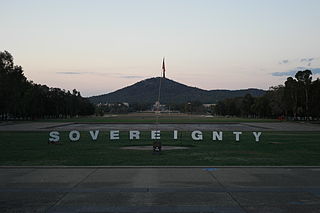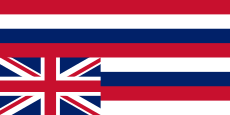
The right of a people to self-determination is a cardinal principle in modern international law, binding, as such, on the United Nations as authoritative interpretation of the Charter's norms. As a principle of international law it is related to the concepts of equal rights, political liberty and representative government with full suffrage; the legitimacy of the territorial status quo depends upon representative government and equal rights. Essentially, those subject to the jurisdiction of the state and its laws must enjoy the same political liberties "without distinction as to race, creed or color". It is wrong to state the principle as "the right freely to determine...political status". Rather, it strongly implies the equality of political rights in a "one man, one vote" democratic government and free and full participation in the political process.

Daniel Kahikina Akaka was an American educator and politician who served as a United States Senator from Hawaii from 1990 to 2013. A member of the Democratic Party, Akaka was the first U.S. Senator of Native Hawaiian ancestry.

Tribal sovereignty in the United States is the concept of the inherent authority of Indigenous tribes to govern themselves within the borders of the United States.

The Bureau of Indian Affairs (BIA), also known as Indian Affairs (IA), is a United States federal agency within the Department of the Interior. It is responsible for implementing federal laws and policies related to Native Americans and Alaska Natives, and administering and managing over 55,700,000 acres (225,000 km2) of reservations held in trust by the U.S. federal government for indigenous tribes. It renders services to roughly 2 million indigenous Americans across 574 federally recognized tribes. The BIA is governed by a director and overseen by the Assistant Secretary for Indian Affairs, who answers to the Secretary of the Interior.

Australian Indigenous sovereignty, also recently termed Blak sovereignty, encompasses the various rights claimed by Aboriginal and Torres Strait Islander peoples within Australia. Such rights are said to derive from Indigenous peoples' occupation and ownership of Australia prior to colonisation and through their continuing spiritual connection to land. Indigenous sovereignty is not recognised in the Australian Constitution or under Australian law.

Native Hawaiians are the indigenous Polynesian people of the Hawaiian Islands.

The Hawaiian sovereignty movement is a grassroots political and cultural campaign to reestablish an autonomous or independent nation or kingdom of Hawaii out of a desire for sovereignty, self-determination, and self-governance. Some groups also advocate some form of redress from the United States for its 1893 overthrow of Queen Liliʻuokalani, and for what is described as a prolonged military occupation beginning with the 1898 annexation. The movement generally views both the overthrow and annexation as illegal. Palmyra Atoll and Sikaiana were annexed by the Kingdom in the 1860s, and the movement regards them as under illegal occupation along with the Hawaiian Islands. The Apology Resolution the United States Congress passed in 1993 acknowledged that the overthrow of the Hawaiian Kingdom was an illegal act.

Mililani Trask is a leader of the Hawaiian sovereignty movement, political speaker, and attorney. One of Trask's contributions to the Hawaiian sovereignty movement was her founding of Na Koa Ikaika o Ka Lāhui Hawaiʻi, a native Hawaiian non-governmental organization focusing on cultural, social, and economic development, education, health, housing, land entitlements, energy, and water issues.

The Office of Hawaiian Affairs (OHA) is a self-governing corporate body of the State of Hawaii created by the 1978 Hawaii State Constitutional Convention.

The Native Hawaiian Government Reorganization Act of 2009 S1011/HR2314 was a bill before the 111th Congress. It is commonly known as the Akaka Bill after Senator Daniel Akaka of Hawaii, who proposed various forms of this bill after 2000.
Rice v. Cayetano, 528 U.S. 495 (2000), was a case filed in 1996 by Big Island rancher Harold "Freddy" Rice against the state of Hawaii and argued before the United States Supreme Court. In 2000, the Court ruled that the state could not restrict eligibility to vote in elections for the Board of Trustees of the Office of Hawaiian Affairs to persons of Native Hawaiian descent.
A Hawaiian home land is an area held in trust for Native Hawaiians by the state of Hawaii under the Hawaiian Homes Commission Act of 1920.

The legal status of Hawaii is an evolving legal matter as it pertains to United States law. The US Federal law was amended in 1993 with the Apology Resolution which "acknowledges that the overthrow of the Kingdom of Hawaii occurred with the active participation of agents and citizens of the United States and further acknowledges that the Native Hawaiian people never directly relinquished to the United States their claims to their inherent sovereignty as a people over their national lands".
Indigenous land rights are the rights of Indigenous peoples to land and natural resources therein, either individually or collectively, mostly in colonised countries. Land and resource-related rights are of fundamental importance to Indigenous peoples for a range of reasons, including: the religious significance of the land, self-determination, identity, and economic factors. Land is a major economic asset, and in some Indigenous societies, using natural resources of land and sea form the basis of their household economy, so the demand for ownership derives from the need to ensure their access to these resources. Land can also be an important instrument of inheritance or a symbol of social status. In many Indigenous societies, such as among the many Aboriginal Australian peoples, the land is an essential part of their spirituality and belief systems.

In the United States, an American Indian tribe, Native American tribe, Alaska Native village, Indigenous tribe or Tribal nation may be any extant or historical tribe, clan, band, nation, or community of Native Americans in the United States. Modern forms of these entities are often associated with land or territory of an Indian reservation. "Federally recognized Indian tribe" is a legal term in United States law with a specific meaning.
In 1898, the United States Congress annexed Hawaiʻi based on a Joint Resolution of Annexation. Questions about the legitimacy of the U.S. acquiring Hawaii through a joint resolution, rather than a treaty, were actively debated in Congress in 1898, and is the subject of ongoing debate. Upon annexation, the Republic of Hawai‘i transferred approximately 1.8 million acres of Hawaiian Government and Crown Lands to the United States (U.S.), which are today held by the State of Hawaiʻi. In the 1993 Apology Resolution, the U.S. government officially apologized to the Native Hawaiian people, acknowledging that the Republic of Hawaiʻi transferred these lands "without the consent of or any compensation to the Native Hawaiian people of Hawaiʻi or their sovereign government" and that "the indigenous Hawaiian people never directly relinquished their claims. .. over their national lands to the United States." Although the lands are commonly referred to as "ceded lands" or "public lands," some refer to them as "seized lands" or "Hawaiian national lands" to highlight the illegal nature of the land transfer, acknowledge different interpretations of the legal effect of the Joint Resolution, and to recognize that Native Hawaiians maintain claims to these lands. Many Native Hawaiian individuals and organizations insist on the return of title, which would be consistent with international law and recognition of the rights of Indigenous peoples, whereas others seek back rent for the use of the land.
Indigenous Australian self-determination, also known as Aboriginal Australian self-determination, is the power relating to self-governance by Aboriginal and Torres Strait Islander peoples in Australia. It is the right of Aboriginal and Torres Strait Islander peoples to determine their own political status and pursue their own economic, social and cultural interests. Self-determination asserts that Aboriginal and Torres Strait Islander peoples should direct and implement Aboriginal and Torres Strait Islander policy formulation and provision of services. Self-determination encompasses both Aboriginal land rights and self-governance, and may also be supported by a treaty between a government and an Indigenous group in Australia.

The Native American Housing Assistance and Self-Determination Act of 1996 (NAHASDA) simplifies and reorganizes the system of providing housing assistance to federally recognized Native American tribes to help improve their housing and other infrastructure. It reduced the regulatory strictures that burdened tribes and essentially provided for block grants so that they could apply funds to building or renovating housing as they saw fit. This was in line with other federal programs that recognized the sovereignty of tribes and allowed them to manage the funds according to their own priorities. A new program division was established at the Department of Housing and Urban Development (HUD) that combined several previous programs into one block grant program committed to the goal of tribal housing. The legislation has been reauthorized and amended several times since its passage.

The political status of Puerto Rico is that of an unincorporated territory of the United States officially known as the Commonwealth of Puerto Rico. As such, the island of Puerto Rico is neither a sovereign nation nor a U.S. state.
Hawaii v. Office of Hawaiian Affairs, 556 U.S. 163 (2009), was a United States Supreme Court case about the former crown lands of the Hawaiian monarchy, and whether the state's right to sell them was restricted by the 1993 Apology Resolution. The Court, in an opinion by Justice Samuel Alito, ruled unanimously that the state had the power to sell the lands free of encumbrances.













